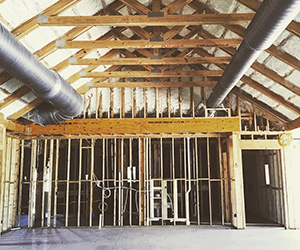 For households and businesses in the South, heat is your year-round nemesis. In the winter, your well-heated home is mocking you by seeping all of that warmth to the outdoors. In the summer, the typical Southern summer heat is creeping back into your cool house. As a result, your energy inefficiency is diminished and your utility bills – and personal comfort – are unpleasant. It’s a rivalry as old as time.
For households and businesses in the South, heat is your year-round nemesis. In the winter, your well-heated home is mocking you by seeping all of that warmth to the outdoors. In the summer, the typical Southern summer heat is creeping back into your cool house. As a result, your energy inefficiency is diminished and your utility bills – and personal comfort – are unpleasant. It’s a rivalry as old as time.
If you are tired of the battle, then insulation is your answer. There are three well-known insulation types:
Fiberglass insulation: the most common insulation found in homes; made of molten glass that is spun into fibers. Available in batts and rolls.
Cellulose insulation: the oldest form of insulation made from recycled or pulverized paper and cloth, treated with fire retardant. It is blown into attic and wall spaces.
Spray foam insulation: is a mixture of liquid ingredients that react to produce a foam-like substance that spray foam insulation contractors in Birmingham, AL use as insulation. Once it’s applied, the spray foam expands quickly, filling in even the smallest cracks and gaps. The foam hardens to create a strong barrier, designed to tackle your ongoing rivalry with heat and humidity. Spray foam insulation contractors use two types of spray foam insulation:
Open-cell spray foam – this insulation dries with an open-particle finish. This product allows moisture to distribute evenly, provides an R-value (the resistance to heat loss or heat gain) of 3.8 per inch, has a lower density, and offers better acoustics between walls, floors, and ceilings. Because of the open-cell structure, minimal coverage of 3.75” is needed to achieve its ideal R-value.
Closed-cell spray foam – is an insulation with a firmer finish once applied and dried. This high-density foam reduces air infiltration and air movement between the indoors and outdoors. Its open-cavity structure strengthens a structure and provides an R-value of 7. Only closed-cell spray foam creates a fully sealed system that acts as an air- and vapor-barrier, with a minimal coverage of 1.5”.
Additional benefits to Spray Foam Insulation:
- Adaptable to most structural surfaces, including horizontal, vertical, and overhead surfaces.
- Ability to coat uneven surfaces, tight spaces, curves, and corners.
- Excellent gap- and air-sealing.
- More mold-resistant than fiberglass or cellulose insulation.
- Has a life expectancy of 80 years.
- Resistant to mice and rodent contamination and damage.
- Improved moisture control.
- Even temperature distribution to your home or business.
With several insulation options to choose from, spray foam is the most effective way to increase your energy efficiency and to reduce your utility bills. Contact EcoLogical Insulation – Birmingham and tell them you want to beat the heat at its own game!

